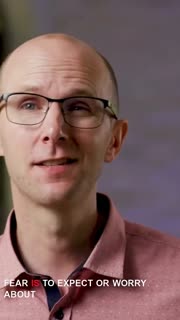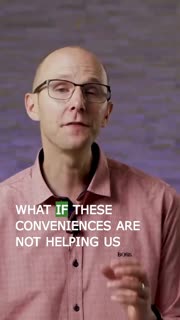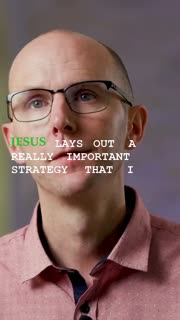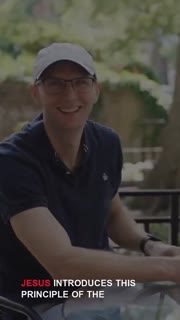Overcoming Fear to Love Our Neighbors
Devotional
Sermon Summary
Bible Study Guide
Sermon Clips
1. "You know, the temptation is to define neighbor in such broad terms that our actual next-door neighbor gets left out in us trying to love everyone equally. Listen to what Pastor Jay Pathak says in his book, Art of Neighboring. He says, The problem is, when we aim for everything, we hit nothing. So when we insist we're neighbors with everyone, we often end up being neighbors with nobody. So this series is encouraging us to love our actual physical neighbors." [02:08] (31 seconds)
2. "Fear is to expect or worry about something bad or unpleasant. You know, it can be a good thing when it prepares you to face something. Like if you're not a little bit fearful before a big presentation or a speech, it might mean that you're not doing the work you need to to prepare. This fear can sort of be a prompt to remind us to prepare or get ready for something. It can also be a prompt to get us to reach out and ask others for help, which can be a good thing. But fear can also paralyze us." [06:17] (34 seconds)
3. "Fear has a way of distorting our perspective. It can change the way that we see others. It can also affect what we assume our neighbors think of us. Our fear is something related to our time, like the fear of like, oh, if I answer the door to these solicitors, if I answer the phone, you know, it's going to take all my time. Like, I'm getting so many spam calls. I don't know if you guys are getting this, but I'm getting so many spam calls lately." [07:52] (26 seconds)
4. "God has given you as a follower of Jesus, as a disciple of Jesus, the power to heal the sick. That's crazy to think about. Not only that, it says here that he's given you the power to drive out demons. And I think we have to think about that, not just in the context of a church gathering or a mission trip, but with your literal next door neighbors. Notice what he says after he says that he's giving you all this power. He says to you, take nothing with you." [10:45] (33 seconds)
5. "What if these conveniences are not helping us grow? What if these conveniences are not helping us grow spiritually? Jesus tells his disciples here, which is very countercultural both then and today. He says, I want you to be dependent on other people because that is sometimes the only way I can get you outside of yourself to build a relationship." [12:05] (22 seconds)
6. "Jesus lays out a really important strategy that I want to unpack today. It's called person of peace. The person of peace strategy is really a movement building strategy. Jesus only had 12 disciples. And as you know, they were not that impressive. They didn't have the resume or the credentials to start a worldwide movement, but Jesus knew their hearts. And he knew that when he placed his power upon them, that they would be able to make an amazing change." [13:32] (28 seconds)
7. "Who you meet on your block can have a huge influence on who else you meet. It's really this principle that led me to meeting our neighbors and to the growth of our church in the early days, and I actually want to take a moment to take you to the backstory of our church from the very beginning." [14:59] (20 seconds)
8. "Jesus introduces this principle of the person of peace that helps us cross cultural boundaries similar to what Malcolm Gladwell calls a connector. A person of peace is a person who helps you cross cultural boundaries they're similar to the connector these are people who welcome the disciples that Jesus sent out they invited these strangers into their homes extended hospitality for the entirety of their stay in that town." [20:43] (32 seconds)
9. "The strategy is that you meet a person of influence in the town and if they're open to friendship with you, then there's a good chance that they will be open to Jesus. And when they come to Christ, there's a good chance that the whole village will come to Christ. You know, this is one of the reasons that we as a church have got to be serious about reaching men because research shows that if you win a father to Christ, then the likelihood that his wife and children also come to Christ is exponentially higher than if it's the other way around." [23:33] (31 seconds)
10. "The assumption of this passage is that when Jesus sends you out to love your neighbor a key part of the mission is to out yourself as a follower of Jesus and then see how people respond this gives us the preview some will welcome you and some will reject you and until we're ready to come face to face with that reality we are not likely to find a person of peace on our block we're likely to stay inside and keep scrolling which really comes back to this topic of fear." [30:48] (32 seconds)
Ask a question about this sermon
2. "Fear is to expect or worry about something bad or unpleasant. You know, it can be a good thing when it prepares you to face something. Like if you're not a little bit fearful before a big presentation or a speech, it might mean that you're not doing the work you need to to prepare. This fear can sort of be a prompt to remind us to prepare or get ready for something. It can also be a prompt to get us to reach out and ask others for help, which can be a good thing. But fear can also paralyze us." [06:17] (34 seconds)
3. "Fear has a way of distorting our perspective. It can change the way that we see others. It can also affect what we assume our neighbors think of us. Our fear is something related to our time, like the fear of like, oh, if I answer the door to these solicitors, if I answer the phone, you know, it's going to take all my time. Like, I'm getting so many spam calls. I don't know if you guys are getting this, but I'm getting so many spam calls lately." [07:52] (26 seconds)
4. "God has given you as a follower of Jesus, as a disciple of Jesus, the power to heal the sick. That's crazy to think about. Not only that, it says here that he's given you the power to drive out demons. And I think we have to think about that, not just in the context of a church gathering or a mission trip, but with your literal next door neighbors. Notice what he says after he says that he's giving you all this power. He says to you, take nothing with you." [10:45] (33 seconds)
5. "What if these conveniences are not helping us grow? What if these conveniences are not helping us grow spiritually? Jesus tells his disciples here, which is very countercultural both then and today. He says, I want you to be dependent on other people because that is sometimes the only way I can get you outside of yourself to build a relationship." [12:05] (22 seconds)
6. "Jesus lays out a really important strategy that I want to unpack today. It's called person of peace. The person of peace strategy is really a movement building strategy. Jesus only had 12 disciples. And as you know, they were not that impressive. They didn't have the resume or the credentials to start a worldwide movement, but Jesus knew their hearts. And he knew that when he placed his power upon them, that they would be able to make an amazing change." [13:32] (28 seconds)
7. "Who you meet on your block can have a huge influence on who else you meet. It's really this principle that led me to meeting our neighbors and to the growth of our church in the early days, and I actually want to take a moment to take you to the backstory of our church from the very beginning." [14:59] (20 seconds)
8. "Jesus introduces this principle of the person of peace that helps us cross cultural boundaries similar to what Malcolm Gladwell calls a connector. A person of peace is a person who helps you cross cultural boundaries they're similar to the connector these are people who welcome the disciples that Jesus sent out they invited these strangers into their homes extended hospitality for the entirety of their stay in that town." [20:43] (32 seconds)
9. "The strategy is that you meet a person of influence in the town and if they're open to friendship with you, then there's a good chance that they will be open to Jesus. And when they come to Christ, there's a good chance that the whole village will come to Christ. You know, this is one of the reasons that we as a church have got to be serious about reaching men because research shows that if you win a father to Christ, then the likelihood that his wife and children also come to Christ is exponentially higher than if it's the other way around." [23:33] (31 seconds)
10. "The assumption of this passage is that when Jesus sends you out to love your neighbor a key part of the mission is to out yourself as a follower of Jesus and then see how people respond this gives us the preview some will welcome you and some will reject you and until we're ready to come face to face with that reality we are not likely to find a person of peace on our block we're likely to stay inside and keep scrolling which really comes back to this topic of fear." [30:48] (32 seconds)










